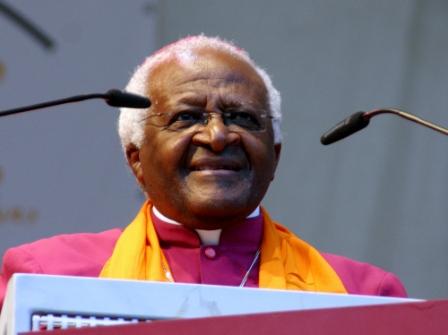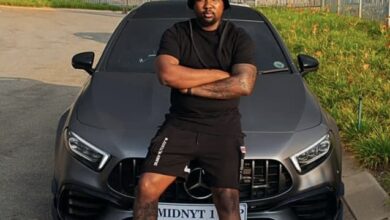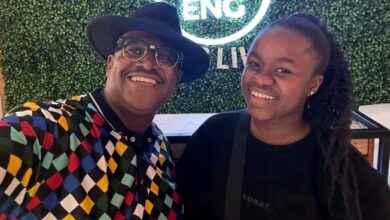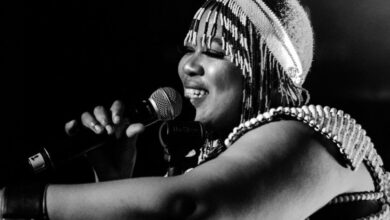40 Things you don’t know about Desmond Tutu

1. Full name Desmond Mpilo Tutu
2. Born 7 October 1931 in Klerksdorp
3. Desmond Tutu is a second of the three children of Zacheriah Zililo Tutu and his wife, Aletta, and the only son
4. Desmond Tutu’s father was a teacher and his mother was a cleaner and cook at a school for the blind
5. Desmond Tutu ‘s family moved to Johannesburg when he was twelve
6. He was the first black South African Archbishop of Cape Town and primate of the Anglican Church of Southern Africa
7. Desmond Tutu wanted to be a doctor
8. Desmond Tutu is a South African social rights activist
9. Desmond Tutu has campaigned to fight AIDS, tuberculosis, poverty, racism, sexism, the imprisonment of Chelsea Manning, homophobia and transphobia
10. Desmond Tutu received the Nobel Peace Prize in 1984; the Albert Schweitzer Prize for Humanitarianism in 1986; the Pacem in Terris Award in 1987; the Sydney Peace Prize in 1999; the Gandhi Peace Prize in 2007; and the Presidential Medal of Freedom in 2009
11. Desmond Tutu studied at the Pretoria Bantu Normal College from 1951 to 1953, and went on to teach at Johannesburg Bantu High School and at Munsienville High School in Mogale City. However, he resigned following the passage of the Bantu Education Act, in protest of the poor educational prospects for black South Africans
12. Desmond Tutu continued his studies, this time in theology, at St Peter’s Theology College in Rosettenville, Johannesburg
13. Desmond Tutu then travelled to King’s College London, (1962–1966), where he received his bachelor’s and master’s degrees in theology
14. Desmond Tutu worked as a part-time curate, first at St Alban’s Church, Golders Green, and then at St Mary’s Church in Bletchingley, Surrey
15. Desmond Tutu later returned to South Africa and from 1967 until 1972 used his lectures to highlight the circumstances of the African population
16. Desmond Tutu wrote a letter to Prime Minister B. J. Vorster, in which he described the situation in South Africa as a “powder barrel that can explode at any time”: the letter was never answered
17. Desmond Tutu became chaplain at the University of Fort Hare in 1967
18. From 1970 to 1972, Tutu lectured at the National University of Lesotho
19. In 1972, Desmond Tutu returned to the UK, where he was appointed vice-director of the Theological Education Fund of the World Council of Churches, at Bromley in Kent. He returned to South Africa in 1975 and was appointed Dean of St Mary’s Cathedral in Johannesburg—the first black person to hold that position
20. Desmond Tutu was Bishop of Lesotho from 1976 until 1978, when he became Secretary-General of the South African Council of Churches
21. Desmond Tutu and his wife Nomalizo Leah Shenxane had four children: Trevor Thamsanqa Tutu, Theresa Thandeka Tutu, Naomi Nontombi Tutu and Mpho Andrea Tutu, all of whom attended the Waterford Kamhlaba School in Swaziland
22. In 1975 he moved into what is now known as Desmond Tutu House in Soweto and he and his family were still living there in 2005.It is said to be one of the few streets in the world where two Nobel Prize winners have lived
23. In 1997, Desmond Tutu was diagnosed with prostate cancer and underwent successful treatment in the US. He subsequently became patron of the South African Prostate Cancer Foundation, which was established in 2007
24. On 23 May 2011 in Shrewsbury, Massachusetts, Tutu gave what was said to be his last major public speech outside of South Africa
25. Desmond Tutu helped form the National Forum Committee to fight the constitutional changes
26. In 1990, Tutu and the ex-Vice-Chancellor of the University of the Western Cape Professor Jakes Gerwel founded the Desmond Tutu Educational Trust. The Trust – established to fund developmental programmes in tertiary education – provides capacity building at 17 historically disadvantaged institutions
27. Desmond Tutu’s work as a mediator to prevent all-out racial war was evident at the funeral of South African Communist Party leader Chris Hani in 1993. Desmond Tutu spurred a crowd of 120,000 to repeat after him the chants, over and over: “We will be free!”, “All of us!”, “Black and white together!”
28. In 1994, Desmond Tutu was an appointed a patron of the World Campaign Against Military and Nuclear Collaboration with South Africa, Beacon Millennium and Action from Ireland
29. In 1995, Desmond Tutu was appointed a Chaplain and Sub-Prelate of the Venerable Order of Saint John by Queen Elizabeth II, and he became a patron of the American Harmony Child Foundation and the Hospice Palliative Care Association (HPCA) of South Africa
30. On 18 July 2007, in Johannesburg, Nelson Mandela, Graça Machel, and Tutu convened The Elders, a group of world leaders to contribute their wisdom, kindness, leadership and integrity to tackle some of the world’s toughest problems. Mandela announced its formation in a speech on his 89th birthday. Tutu served as Chair of The Elders from the founding of the group in July 2007 to May 2013. Upon stepping down and becoming an Honorary Elder
31. As of March 2012, Desmond Tutu was a member of the Advisory Board for Global March to Jerusalem (GM2J)
32. In 2003, Desmond Tutu accepted the role as patron of Sabeel International, a Christian liberation theology organisation which supports the concerns of the Palestinian Christian community and has actively lobbied the international Christian community for divestment from Israel. In the same year, Tutu received an International Advocate for Peace Award from the Cardozo School of Law, an affiliate of Yeshiva University, sparking scattered student protests and condemnations from representatives of the Simon Wiesenthal Center and Anti-Defamation League
33. Desmond Tutu was appointed as the UN Lead for an investigation into the Israeli bombings in the Beit Hanoun November 2006 incident. Israel refused Tutu’s delegation access, so the investigation didn’t occur until 2008
34. In 2007, the president of the University of St. Thomas in Minnesota cancelled a planned speech by Tutu, on the grounds that his presence might offend some members of the local Jewish community
35. In 2003, Desmond Tutu was elected to the board of directors of the International Criminal Court’s Trust Fund for Victims. He was named a member of the UN advisory panel on genocide prevention in 2006
36. In January 2003, Desmond Tutu attacked British Prime Minister Tony Blair’s stance in supporting American President George W. Bush over Iraq. Tutu asked why Iraq was being singled out when Europe, India and Pakistan also had many weapons of mass destruction
37. In October 2004, Desmond Tutu appeared in a play at Off Broadway, New York, called Guantanamo – Honor-bound to Defend Freedom. This play was highly critical of the US handling of detainees at Guantanamo Bay. Tutu played Lord Justice Steyn, a judge who questions the legal justification of the detention regime
38. In May 2009 Desmond Tutu was awarded an honorary Doctor of Divinity degree from the University of Edinburgh
39. In 1996 Desmond Tutu was the first recipient of the Archbishop of Canterbury’s Award for Outstanding Service to the Anglican Communion, a new award created especially for him
40. Desmond Tutu has also compiled several books of his speeches and sayings




